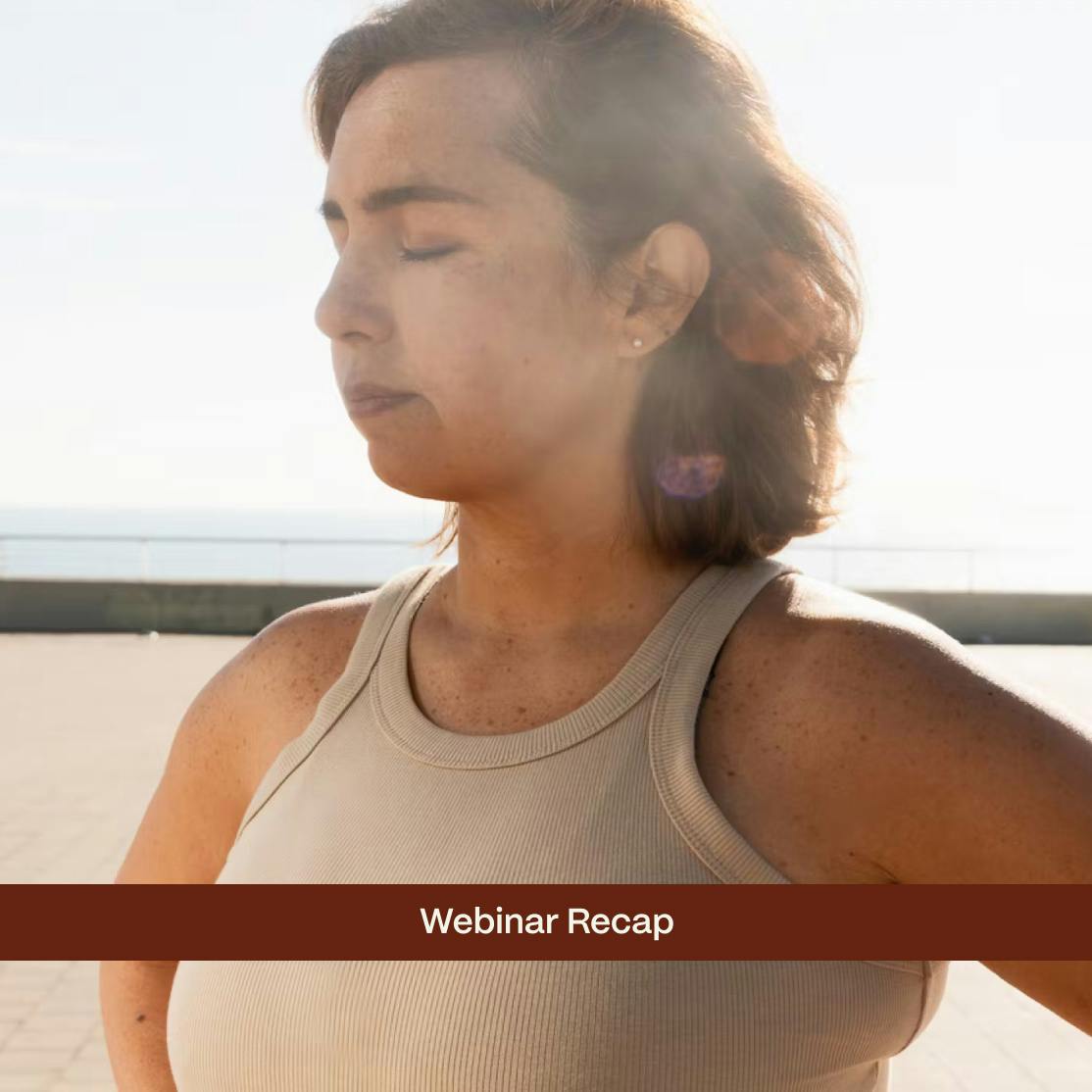When Mary Claire Haver, board-certified OB/GYN, started going through menopause she—like many other women in midlife—noticed the scale creep up. On top of the added pounds, she was dealing with brain fog, hot flashes, and disrupted sleep. Hormone therapy eased the hot flashes, but the weight wouldn’t budge despite increasing her workouts and fastidiously counting calories.
That’s when she had a lightbulb moment and realized that the “exercise more, eat less” guidelines taught in medical school (advice she gave her own patients) just didn’t cut it when it came to menopausal weight gain. Convinced that there must be a better way, she turned to nutrition experts who pointed her toward the inflammation-menopause connection.
After diving deep into the research, she eventually came up with a plan to lose the weight—but more importantly—improve her health and reduce menopause symptoms. She’s shares the play-by-play in her bestselling book, The Galveston Diet, and her social channels.
Midi’s Dr. Kathleen Jordan caught up with Dr. Haver to learn more about her advice for midlife health, why she’ll never count another calorie, and the one wellness tip she wishes all women would take to heart.
Dr. Jordan: You call the Galveston Diet an anti-inflammatory nutrition program. What do menopausal women need to know about inflammation?
Mary Claire Haver: When estrogen levels decline during menopause, we see inflammation levels go up. That means we’re no longer protected from conditions like heart disease and strokes. As those disease risks go up, so does the amount of visceral fat (the fat stored deep inside the belly that has been shown to be dangerous for our health).
Fortunately, there are certain habits that have been shown to lower inflammation, decrease visceral fat, and reduce your risk for these diseases.
One that I can’t stress enough is to get enough fiber in your diet. Most women only get about 12 grams of fiber in their diet, but those who consistently get 25 grams or more every day have better health outcomes and less visceral fat. I suggest that people track their intake for a couple of weeks using a free online tracker (my favorite is Chronometer). See where you stand, and if you’re not getting enough, you can start to add more.
KJ: Speaking of losing belly fat, what particular weight loss method do you endorse in The Galveston Diet?
MCH: I want to change the nomenclature here. It's not about weight loss, it's about health gain. So many of us spend a lifetime fighting to get to a number on the scale, and we've sacrificed our health in order to do so. But a smaller body shouldn’t be your goal. Your health is defined by so much more than that.
And sure, a lot of the ways that we have been taught to lose weight work—but at what cost? Take severe caloric restriction. Half of the weight that we lose is muscle and not fat. And when we lose muscle, our basal metabolic rate goes down and we don’t burn as many calories at rest.
Instead, The Galveston Diet focuses on improving your health through a unique plan that helps decrease visceral fat and improves muscle mass. The scale may be higher, but you will be a lot healthier with more muscle mass.
I tell my patients that we are not working out for bikini bodies anymore. Everything we do is for our old lady bodies. We are working toward strong bones, a strong mind, and a strong heart—and how we move and eat is going to determine that. But notice I never said anything about the scale!
KJ: You don’t recommend tracking calories. Why is that?
MCH: The Galveston Diet looks at nutrition and the health benefits of specific nutrients instead of calories. It also encourages getting vitamins and nutrients from food. I have a challenge, called the Fab Four challenge, where you eat the way you normally do for a week and track to see where you fall in terms of fiber, omega-3, vitamin D, and magnesium intake. Then the following week, you use food—not supplements—to try to get 100% of the recommended daily allowance of each.
I put the challenge on TikTok, and it blew up. People were eating more fiber, fruits, vegetables, lean meats, fish and they said they were feeling so much better. They were sleeping better, their hot flashes were better—and just from these few simple changes!
KJ: Can supplements also help fill in those nutritional gaps?
MCH: Nutrition is going to almost always outweigh a supplement. Focus on nutrition first.
One exception is vitamin D. About 90% of my patients are deficient in vitamin D through no fault of their own. We don't absorb it very well, especially with age. We're staying out of the sun for good reason. So vitamin D is a good, safe supplement. Fiber is another one. Aim to get that 25 grams from food, but if you want to take a supplement to help get you to the finish line—or push you well past it—no problem.
KJ: How does alcohol play a role in weight management?
MCH: Drinking alcohol makes managing your weight much more difficult. And if you’re drinking wine because it’s been said to be good for your heart, I’m sorry to say that those studies have been completely disproven. No amount of alcohol is proven to be safe. There are definitely less caloric ways to enjoy an alcoholic beverage, but at the end of the day, it will make weight loss harder.
Alcohol can also completely disrupt your sleep. That’s true for me, personally. It's a lot easier to say no to drinking now because nothing's more important to me than sleeping.
KJ: I’m glad you brought up sleep. Can we talk a bit about how it’s intertwined with nutrition and health and weight?
MCH: Sleep needs to be the cornerstone of your healthy routine, because that’s where all the magic happens. Nighttime sleep is when we reset, when our muscles regenerate, when we clear out junk proteins, when we really combat aging. If you are not sleeping enough and feeling well rested, then you are on the struggle bus in all kinds of ways. So prioritizing your sleep and sleep hygiene—turning off the screens, cutting off caffeine early, and changing anything else that might disrupt your sleep—is a must. If you’ve done all that and you're still not sleeping, then we can consider medication. If you're waking up at three in the morning and not able to go back to bed, estrogen therapy can go a long way for you.
KJ: Women in midlife have a lot going on, from running companies and households to taking care of their kids and parents. What’s your top tip for making wellness simple and easier for them?
MCH: Again, prioritize fiber in your diet. When you do that, you’re going to get so many other benefits from foods that are rich in fiber but also other micronutrients. You’ll feel full, so you won’t overeat as much. And you'll slow down the absorption of glucose in your system, which will lower your insulin and inflammation levels.
If you want to add something else on, experiment with intermittent fasting, which can also help reduce fat stores and lower inflammation. It’s as simple as delaying your breakfast for an hour or two. Once you’re accustomed to that, push your first meal of the day out a bit further.
I make multiple recommendations in The Galveston Diet, but I don’t expect anyone to go in and adopt them all at once. Let's form new habits slowly, one at a time—starting with fiber.
Learn more about Dr. Haver’s approach to midlife health in her book, The Galveston Diet.
If you’re in perimenopause or menopause and want guidance from clinicians who specialize in women’s midlife health, book a virtual visit with Midi today.
Hormonal change is at the root of dozens of symptoms women experience in the years before and after their period stops.
Our trained menopause specialists can help you connect the dots to guide you towards safe, effective solutions.
Whether you need personalized guidance or a prescription routine to tackle symptoms—including brain fog, hot flashes, sleep trouble, mood swings, and weight gain—we’ve got you covered. Learn more here.
Midi’s mission is to revolutionize healthcare for women at midlife, wherever they live and whatever their health story. We believe that starts with education, to help all of us understand our always-changing bodies and health needs. Our core values guide everything we do, including standards that ensure the quality and trustworthiness of our content and editorial processes. We’re committed to providing information that is up-to-date, accurate, and relies on evidence-based research and peer-reviewed journals. For more details on our editorial process, see here.
 Midi Team
Midi Team


